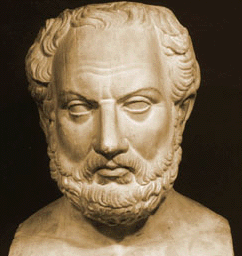

This quotation comes from a speech made in The Peloponnesian War, Thucydides' magnum opus. The retreating Hellenic army, demoralized and hungry, had suffered a crushing defeat after the siege of Syracuse. Nicias, whose name rings with irony as it is derived from the Greek word "ni/kh" (victory), a general in the Athenian army, moved amongst his men, encouraging and comforting them with his words and exhorting them to rebuild their fallen state. What follows is Nicias' speech to his troops:
‘Athenians and allies, even in our present position we must still hope on, since men have ere now been saved from worse straits than this; and you must not condemn yourselves too severely either because of your disasters or because of your present unmerited sufferings. I myself who am not superior to any of you in strength--indeed you see how I am in my sickness--and who in the gifts of fortune am, I think, whether in private life or otherwise, the equal of any, am now exposed to the same danger as the meanest among you; and yet my life has been one of much devotion towards the gods, and of much justice and without offence towards men. I have, therefore, still a strong hope for the future, and our misfortunes do not terrify me as much as they might. Indeed we may hope that they will be lightened: our enemies have had good fortune enough; and if any of the gods was offended at our expedition, we have been already amply punished. Others before us have attacked their neighbors and have done what men will do without suffering more than they could bear; and we may now justly expect to find the gods more kind, for we have become fitter objects for their pity than their jealousy. And then look at yourselves, mark the numbers and efficiency of the heavy infantry marching in your ranks, and do not give way too much to despondency, but reflect that you are yourselves at once a city wherever you sit down, and that there is no other in Sicily that could easily resist your attack, or expel you when once established. The safety and order of the march is for yourselves to look to; the one thought of each man being that the spot on which he may be forced to fight must be conquered and held as his country and stronghold. Meanwhile we shall hasten on our way night and day alike, as our provisions are scanty; and if we can reach some friendly place of the Sicels, whom fear of the Syracusans still keeps true to us, you may forthwith consider yourselves safe. A message has been sent on to them with directions to meet us with supplies of food. To sum up, be convinced, soldiers, that you must be brave, as there is no place near for your cowardice to take refuge in, and that if you now escape from the enemy, you may all see again what your hearts desire, while those of you who are Athenians will raise up again the great power of the state, fallen though it be. Men make the city and not walls or ships without men in them.’
A bit after the age of thirty, Thucydides was elected to the board of strategoi, a board of military men who exercised political power in foreign affairs. He was given command of the Athenian fleet in the seas around Thrace. The Spartans defeated his fleet in a surprise attack on Amphipolis. He was exiled for this failure and returned to his home shortly before his death in 404 BC.Thucydides meant to write the definitive work on the the Poloponnesian war -- in his own words, he wrote "not for immediate applause but for posterity." This aspiration makes his work doubly interesting as he wrote the history of the war more or less contemporaneously with its occurrence. He took notes on the events as they happened, later organizing them into a coherent and sequential story. Lastly, he embellished and augmented them, making them into a fascinating history ready for public consumption.